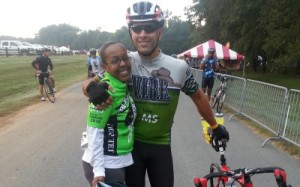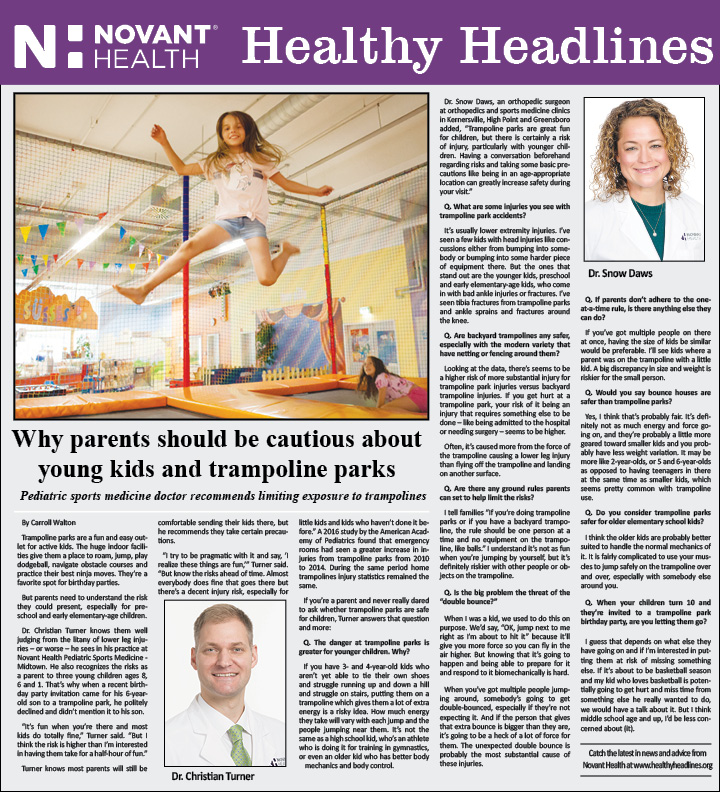 Greg Kiser is a Greensboro Police Department officer who enjoys cycling for exercise. On July 17, 18, and 19, he’ll be riding 252 miles in South Carolina to raise awareness for Alzheimer’s disease.
Greg Kiser is a Greensboro Police Department officer who enjoys cycling for exercise. On July 17, 18, and 19, he’ll be riding 252 miles in South Carolina to raise awareness for Alzheimer’s disease.
Alzheimer’s disease is a progressive illness that results when plaques and tangles attach to brain cells. It’s a disease that hits home for Kiser because there is a history of it in his wife, Toni’s, family. For Kiser, the implications are huge and far-reaching.
“It’s something Toni’s dealt with for a very long time and being her husband, it’s a worry of mine. We have a young daughter and I’ve had to tell her that I’m doing this ride for her too. This could be my legacy to her later, if she should ever get diagnosed some day. I’m also doing it for everyone out there who doesn’t realize how big a problem this is. Five million people in the U.S. currently have Alzheimer’s, but it could rise to sixteen million by 2050. Unfortunately, a lot of folks who are going to contract this disease might not have the money for a nice place to go.”
He continued.
“The most scary part for me is the thought that there’s going to come a time when my wife is going to look at me the same way she has for 30, 40 years and not recognize me and not remember all the things we’ve done together throughout our lives,” he said. “That just tears me up inside and I don’t want anyone to have to go through that.”
As a police officer, Kiser has had experience dealing with disoriented Alzheimer’s sufferers and their families. He has learned firsthand how confusing and frightening the disease can be for the people who have it and has a special sensitivity to those people who don’t understand what is happening to them.
“It’s not just a disease that makes you forget things. It changes the dynamic of the entire family and affects a person’s reality. Being with the Greensboro Police Department, I’ve gone on calls where there’s been an Alzheimer’s patient who has called and said someone has stolen their car,” he said. “They are absolutely convinced their son or daughter has stolen it, so we respond to the call and come to find out they haven’t had a car in fifteen years. They feel victimized by their family and by local law enforcement because there isn’t anything we can do to help them. You can’t file a report on something that doesn’t exist.”
The condition is also compounded by issues of wandering. Kiser reports that Alzheimer’s patients will wander off to find homes they lived in as a child. He said they have found patients as far as 10 miles away from the facility or family home in which they are currently living. Kiser received special training when it comes to Alzheimer’s patients who are reported missing.
“We are trained to find out where they used to live, and if they are somewhat local because that is usually where they will go,” he explained. “Imagine yourself twenty years from now and you are living in a new place you don’t recognize because you can’t remember anything from the past twenty years. Where will you want to go? Where were you most comfortable?”
Kiser has even gotten calls from people claiming they have been kidnapped and are being held against their will, only to answer the call and discover they have Alzheimer’s and are actually in their own home, but because it is more recent they don’t remember it.
When Kiser first heard about Ride to Remember last year, it was through a friend on Facebook. At that time, he was on sabbatical from cycling, following a collision with a U-Haul truck. Kiser is an endurance rider and when he saw the race was 252 miles, it piqued his interest. He realized it was too late to donate and he didn’t have his bike anymore, but could not stop thinking about it.
“When I saw it was for Alzheimer’s, I wished I’d done a race like that when I was still riding. I thought it looked like fun, but I wasn’t riding at that time. Then, ironically, around August I noticed I was gaining some weight. I decided to start riding again to get back into shape because it was the only exercise I enjoyed. When it came time to buy a bike, it was more expensive than I was comfortable with. My wife understood and was supportive of it and saw that I needed it back in my life and needed it for my own mental balance,” he said. “I told her if I did get a new bike, when I was able to, I would make a charity ride for Ride to Remember in honor of her deceased grandmother and aunt, who is in a facility with Alzheimer’s in New Jersey. She was very excited about that.”
Kiser did get the new bike and started back with 50 miles.
“That almost killed me,” he laughed. “But I kept working at it.”
Then, as luck would have it, Kiser was hit by another car. Fortunately, the driver’s insurance paid for the purchase of a new bike, but he had to wait for it to be shipped to him. While he waited, he put the damaged bike on a stationary trainer and started training while he waited for the new bike to arrive. By the time the new bike arrived, Kiser said that he was able to reach speeds of up to 62 miles per hour at his fastest pace. He knew he was ready for Ride to Remember, so he signed up to participate in the race.
One thing Kiser stresses is that Ride to Remember is not just a race. It is an eight-month-long event that begins in November and culminates with the race in July. It is a process of raising awareness, as well as funds. It is also a family event for Kiser. He said his wife and daughter plan to be at the rest stops cheering him on.
“The ride is more or less our reward for going out and raising the money and awareness,” explained Kiser. “The actual Ride to Remember event started in November, it actually runs from November to July. It’s a bunch of cyclists getting together and doing what they can do to benefit the Alzheimer’s Association. At the end they throw us a party and let us go on a bike ride.”
Ride to Remember is set up to spread over three days in three stages of varying lengths of 67, 85, and 100 miles respectively. It will take place on public roads that run from Simpsonville to Charleston, SC. Many people may not realize the dangers involved in races like this, but according to Kiser, there is usually at least one crash in every race.
“It’s a risk every time a cyclist goes out and rides. That puts a lot of these charity rides into perspective,” he said.
While there are inherent risks for any cycling activity, Kiser feels that the benefits outweigh those risks.
“I’m very appreciative to those who have already donated. I’ve already gotten over $1,000 worth of donations and while that is twice what I needed to be able to ride, I’m still not stopping because the money is going where it needs to go. I want to have as many resources as possible and I have plenty of time to collect more money and I’m going to do so.”
The immediate, short-term benefits will go to the SC chapter (of the Alzheimer’s Association), but long-term benefits of this ride will go to nationwide research. What is good for one state is good for all states, as far as research and finding cures goes,” he remarked. “My goal is to ultimately end this disease and it doesn’t matter to me which state gets the short-term benefits because helping patients with Alzheimer’s is helping patients with Alzheimer’s. The end results will be on a national scale that will help everyone.”
If you would like to make a donation to Kiser’s donations page, visit act.alz.org/goto/GregKiser.
For more information about Alzheimer’s visit the Alzheimer’s Association website at www.alz.org.









